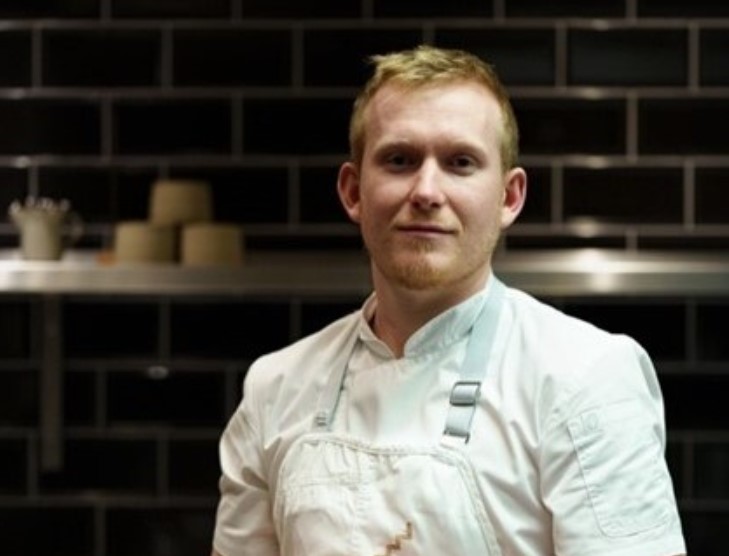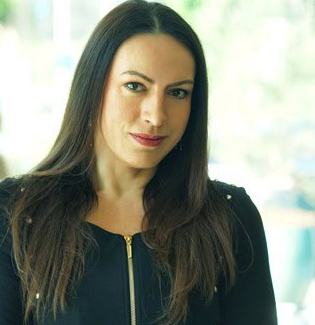A life in balance looks different for everyone, but for Jake Simpson – former managing director and head chef at Bocca di Lupo in Soho – it all came down to leaving London behind and trying something a little different. He’s now at the helm of the gorgeous restaurant in The Rectory, a country house hotel in the Cotswolds. Martha Davies caught up with him to chat about his culinary journey so far.
Interview: Jake Simpson, Head Chef At The Rectory Hotel, Crudwell
Hi Jake! How did you get into cooking?
At university, I was in self-catering accommodation, and on day one, I ate a Pot Noodle and never really wanted to repeat that experience… so I very quickly started teaching myself to cook, and I got really absorbed by it very quickly. It helped that I was at Edinburgh University, and the produce available there was incredible. I actually discovered a really good game dealer – a place called George Bower in Stockbridge. I didn’t really have any money but I had a huge amount of time, and it actually worked out great as a student who was very keen on food, because I could buy stuff cheaply and take the time to deal with it properly.
That said, I finished university with absolutely no idea what I wanted to do. I was obsessed with food by that point, but I didn’t really want to work in a restaurant because, you know, they have a bad reputation for long hours with not much money involved. But I had sort of ruled out everything else. Luckily, my godfather worked for a company called Brindisa, and he knew just about every chef in London. So he took me out for lunch with Jeremy Lee at the Blueprint Café, and at the end of that meal, Jeremy sat down and we had a chat. He asked if I wanted to spend a week working there – and I wasn’t doing anything else, so I thought it was great. And after a few days of that, he offered me a job, and I was already absolutely in love with becoming a chef. So that was it, really.
After your previous work at Bocca di Lupo in Soho, what drew you to Wiltshire – and to The Rectory specifically?
Bocco and The Rectory are definitely very different. Bocca, in a way, is kind of the archetypal London restaurant, It’s in the middle of the theatre district, you’re doing 200-plus covers on a busy night, and it’s a really fantastic restaurant, it’s really fun. But I reached the stage in my personal life where I just wanted to move out of London – I have two kids, and having children in London is a nightmare. And in my professional life, I wanted a closer connection to the produce than you’re able to get in London. You know, in London, you can get absolutely incredible ingredients from the entire world, but there is a sense of disconnect – you order it and it comes in. And I wanted to be a little bit closer to the ingredients.
In terms of Wiltshire specifically, my wife’s from Wiltshire, and I’m a little bit stateless: I was born in London but I grew up in Hong Kong and Australia; my parents moved to Suffolk when I was about 13, but I was at boarding school up in Yorkshire; and I spent four years in Edinburgh, of course. So I don’t feel a hugely strong connection to anywhere, and Wiltshire was also somewhere I always came to as a kid – my mum’s best friend is down here, my uncle’s always had a house here, and my brother used to live here for quite a while. So it was a fairly easy decision to move. It’s a gorgeous part of the country and it’s a great place for produce; not just Wiltshire but Dorset, Somerset – there are great farmers, people making really nice cheeses and charcuterie, and it just helps me feel more connected to the food.
The Rectory really is the polar opposite of Bocca; it’s much more laid back. The dining room and the grounds are just gorgeous, and there’s a really nice kitchen garden, and the owner has been amazing in terms of letting me do what I want. They’ve placed a lot of trust in me.
Can you tell us about the kind of dishes on offer at The Rectory?
I suppose modern European is perhaps the best term, but that’s so vague that it’s essentially meaningless. Really it’s a base of English food with a little bit from further afield, which I guess could also be called modern British – what Jeremy Lee does at Quo Vadis.
At lunch, there’s a slightly more casual sharing plate structure: there are some big plates, but there are lots of smaller plates, lots of bites. You can come in and have a big feast, or you can just have some nibbles.
In the evening, there’s a much more classic a la carte menu – just starters, mains, desserts – but we do try to feature a dish to share between two, and we always have a few snacks that you can enjoy with a drink in the bar beforehand.
The important bit for me is to make sure that dishes don’t sit on the menu for too long, which keeps it relatively fresh – so if you were to come in twice in a month, you’re not going to be thinking, “I’ve already eaten everything I wanted to eat.” And it’s also fun from a cooking standpoint as well, since it means we’re not cooking the same thing day after day after day, which gets onerous quite quickly.
Where do you find inspiration for your dishes?
I do a lot of reading and I love cookbooks, especially ones that are a bit more focused on cuisine or a specific region or country. I love the older ones – I think Patience Gray’s Honey from a Weed is absolutely gorgeous; it brings such romance to food. So I’m always reading stuff like that. And then it’s usually just a question of what I want to do, and whether there’s a way to make sure it fits relatively neatly within the rest of the menu. Things absolutely need to be delicious, but I’m also very interested in the history of dishes, even if it’s sort of unfashionable – we’ve got ham and melon on the menu the moment, for example, which is about as eighties as you can get, but it’s just about making the best version of it you can. With that dish, we’re using Zerbinati melons from a world renowned melon obsessive called Oscar Zerbinati in Lombardy, and we’re taking things that might seem a little recherche and making sure they’re absolutely delicious.
How do you source your produce? Is there anything on the menu that’s sourced locally?
The other side of the menu, of course, is just about what I can get my hands on; it’s all about the ingredients. We really try – particularly with animals, you know, fish and meat – to use as much of the animal as we can. From a sustainability angle, often we’ve got a decision to make, which is either bin a quarter of what we’re buying in or work with it and try to create something really delicious that’s also reflective of where it came from.
In terms of sourcing, by and large I try to use local ingredients. Of course, we have the kitchen garden, from which we get herbs, green beans, beetroot, chard, tons of nasturtiums, raspberries, loads of stuff. And then we’ve planted fig trees in the hotel grounds, so we’ll make fig leaf oil, and we’re pickling underripe figs, too. Wealso get deliveries of things like apples, pears and herbs from the gardens of local people who ]have far too much and don’t know what to do with them, which is really lovely. Plus, my sous chef James has a fondness for shooting, and we’ll work with local game dealers to get birds, venison, things like that, and we use a lot of fish from Cornwall. I do buy a few bits from Italy – like the melons, and Cuore Del Vesuvio tomatoes from Campagna, for example – and all of that stuff is driven to England rather than being flown over.
Tell us a bit about The Rectory’s monthly supper clubs.
They’re a really nice way to work with the seasons and changing produce. So we’ll use things which are coming into season, and it’ll be maybe the first time we’ll get pheasants on the menu, or the first time we’ll put berries on for the summer, for instance. The whole menu is really driven by what’s available, but we really try and showcase what’s going on at the supper clubs and hone in on those ingredients for a few weeks.
Plus, just like when you’re assembling a plate of food and you want to make sure everything sits together, there are meals that I remember from my life that weren’t about the individual dish, but about the entire meal and how that flows. So, with the supper clubs, it’s nice to be able to really fine tune that.
How would you describe your food ethos?
For me, cooking is about the beauty of the ingredients and bringing out the best in them. It’s seasonal; it’s just about really nice food and bringing people together.
What are your most memorable meal?
When I was working for Jeremy Lee, I came in to eat one day, and we had cured salmon, and then grouse, and then almond tart with Mirabelle plums. We all had exactly the same thing and it was just a gorgeous menu.
What are three ingredients you can’t live without?
The first would be really good olive oil. Then cream – I don’t actually use masses of cream, but we use it in our ice cream, and then we use it in desserts and sauces, and then leftover buttermilk goes into our waffles for breakfast or scones for afternoon tea. My final ingredient would be nuts: currently we’re using a lot of almonds on our menu, and Jeremy’s almond tart is one of my all time favourites.
The next supper club at The Rectory will take place on 3 October. therectoryhotel.com







